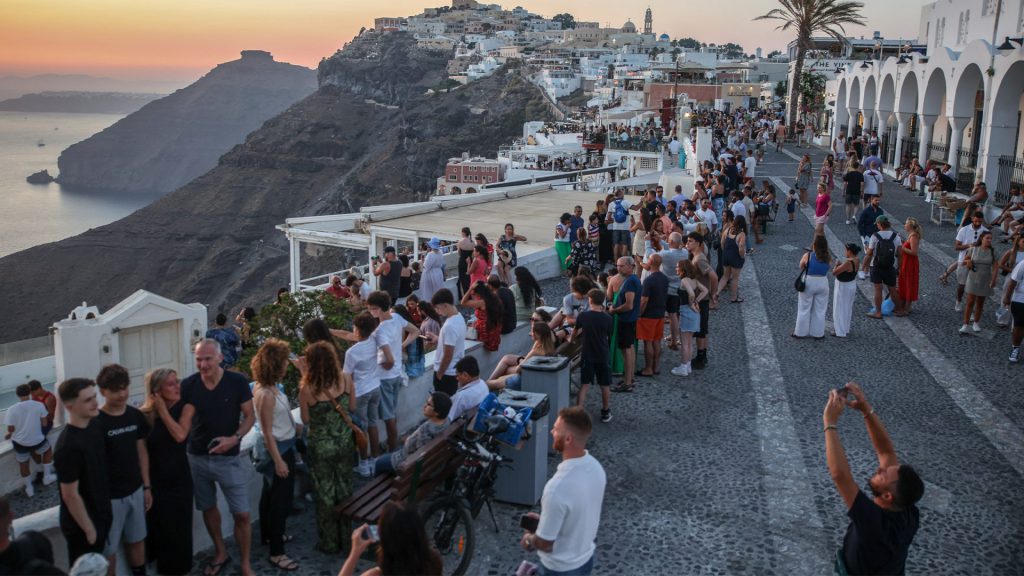
Greece has announced a series of new measures to manage the impact of high tourism levels, including restrictions on short-term holiday rentals and fees on cruise ship traffic, in an effort to curb excessive tourism. However, industry leaders warn that the proposed restrictions could harm a vital economic sector, as the country is on track to record its highest number of visitors ever this year.
Speaking at a trade fair in Thessaloniki last week, Prime Minister Kyriakos Mitsotakis outlined the measures, emphasizing that while tourism significantly supports the Greek economy with resources and jobs, it must also contribute fairly to social returns. “Tourism supports the economy with resources and jobs, but it must also pay its special share of social returns,” Mitsotakis said.
The announcement comes amid growing concerns in Mediterranean countries, including Spain, Italy, and Greece, about the strain on local communities and the environment due to surging visitor numbers and limited regulation.
Tourism Minister Olga Kefalogianni, however, dismissed claims of over tourism in Greece, stating: “There is no over tourism in Greece. What we’re seeing is overconcentration in specific areas during peak periods.” She added that Greece must balance tourism growth with the protection of its cultural and natural heritage while ensuring local well-being.
Despite concerns about the impact of these new measures, Mitsotakis underscored the continued importance of tourism, which contributes over 25% to Greece’s GDP. “It is very dangerous to present Greece as a place that is not welcoming to tourists,” he said.
One of the key measures announced includes a fee of up to €20 for cruise ship passengers visiting popular islands like Santorini and Mykonos, where multiple ships, each carrying thousands of tourists, dock daily during the peak season. The decision drew criticism from George Koubenas, chair of Greece’s Union of Cruise Ship Owners, who argued that cruise passengers do not use local infrastructure like water and electricity to the same extent as other tourists. Koubenas suggested that a flat fee for all tourists, similar to the one imposed in Venice, would be a fairer solution.
In addition, Greece will regulate short-term rentals through online platforms such as Airbnb, starting with a one-year ban on new rentals in three areas of Athens, where tourists often begin or end their holiday before traveling to island destinations. Andreas Chiou, president of the Greek Property Managers Association, criticized the move, stating that the ban was motivated by pressure from hotel owners who view short-term rentals as a competitive threat.
Chiou also raised concerns about a new measure incentivizing property owners to switch to long-term rentals, which includes a three-year tax exemption, arguing that it would be challenging for owners who renovate properties for short-term rentals to make a profit from long-term leases. “Owners could stop using official platforms to promote their properties, as has happened in cities like New York,” he warned.
Economists estimate that holiday rentals in Greece increased by 28% between 2019 and 2023, with the number of available properties doubling during this period, according to a report by Grant Thornton for Greece’s Chamber of Hotels. Meanwhile, hotel bed availability increased by only 3.5%.
Mitsotakis also announced a new climate crisis tax on hotel stays and short-term rentals from April to October, with the revenue directed towards improving infrastructure in tourist areas. “A significant portion of the revenue will go back to local communities, allowing them to better prepare for the burden they face each summer,” he said.
Italy recently proposed increasing tourist taxes to promote responsible travel, with new fees reaching up to €25 a night for luxury accommodations. However, Yiannis Paraschis, president of the Greek Tourism Confederation, cautioned that imposing such fees could make Greece less competitive, especially as its tourism industry is still recovering from the economic crisis a decade ago and the COVID-19 pandemic. “We must be more cautious than our Mediterranean rivals,” Paraschis stated. “In Greece, tourism is vital to our economy in a way it isn’t for other countries.”
Greece welcomed a record 36.1 million visitors in 2023, and tourist arrivals surged by 16% to 11.6 million in the first half of 2024, according to the Bank of Greece, suggesting another record year is on the horizon. As Greece navigates these new regulations, the challenge will be balancing tourism growth with sustainable practices that protect its cultural and natural heritage.


